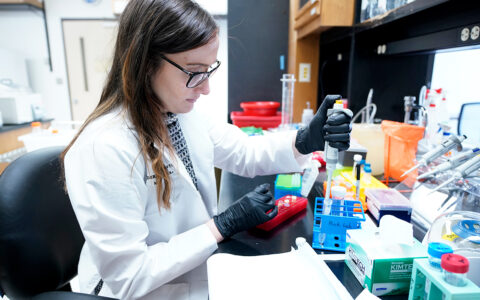A new collaborative at Vanderbilt University Medical Center aims to lower rates of diabetes, cardiovascular disease and obesity in the Southeast by focusing on 39 percent of the region’s residents – minorities who are at disproportionally higher risk for those conditions.
The Southeast, based on the U.S. Department of Health and Human Services’s Region IV division, is the home of nearly 15 million African Americans and 9 million Latinos, two groups that fare worse on many health indicators.
Earlier this year, the National Institute on Minority Health and Health Disparities provided more than $12 million for Vanderbilt to work alongside Meharry Medical College and the University of Miami to develop the Southeast Collaborative for Innovative and Equitable Solutions to Chronic Disease Disparities.
“The burden of racial and ethnic health disparities is most evident in the southeastern United States, where Black and Latino populations suffer the highest rates of cardiovascular disease, diabetes, obesity, hypertension, cancer and asthma,” said principal investigator Consuelo Wilkins, M.D., senior vice president and senior associate dean for Health Equity and Inclusive Excellence at Vanderbilt.
There is an urgent need to identify evidence-based interventions that can reduce and ultimately eliminate chronic disease health disparities, Wilkins said. “These chronic conditions are a primary cause of poor health, reduced quality of life and premature death, and account for more than 50 percent of health care expenditures.”
“Engaging community stakeholders throughout all phases of the research, which is central to the work of the collaborative, is therefore vitally important to developing and testing interventions that have the greatest likelihood of mitigating disparities.”
Incorporating Social Determinants
Primary drivers of racial and ethnic health disparities involve an interplay of social, behavioral, environmental, and biological factors. Research teams with expertise in multiple disciplines will work together in the collaboration to develop and test multicomponent strategies based on determinants that drive disparities.
Stephania Miller-Hughes Ph.D., associate director of the Meharry-Vanderbilt Community-Engaged Research Core, said an important emphasis of the work is the input from the communities whose health disparities are of concern.
“Engaging community stakeholders throughout all phases of the research, which is central to the work of the collaborative, is therefore vitally important to developing and testing interventions that have the greatest likelihood of mitigating disparities.” Miller-Hughes said.
“The burden of racial and ethnic health disparities is most evident in the southeastern United States, where Black and Latino populations suffer the highest rates of cardiovascular disease, diabetes, obesity, hypertension, cancer and asthma.”
Among the initial projects will be “Adaptive Interventions for Tobacco Cessation,” led by Bryan Heckman, Ph.D., founding director of the Meharry Medical College Center for the Study of Social Determinants of Health, and “Reducing Disparities in Sleep Apnea and Related Cardiometabolic Outcomes,” led by Naresh M. Punjabi, M.D., chief of pulmonary, critical care, and sleep medicine at the University of Miami.
“The best science brings together expertise from all disciplines relevant to a problem,” said principal investigator Nancy Cox, M.D., the Mary Phillips Edmonds Gray Professor of Genetics at Vanderbilt.
“Health disparities is a challenging but critically important problem that is inherently multidisciplinary. Particularly as we now seek to address disparities in health related to chronic diseases, the need to use all available data with all relevant expertise is the only way forward.”
Building the Framework for Change
On the collaborative’s list of goals is to:
- Establish an infrastructure to foster research collaborations
- Facilitate a pilot awards program focused on chronic disease disparities
- Examine health factors using data science, technology and bioinformatics
- Integrate community priorities into the center’s infrastructure as they develop and test appropriate interventions.







